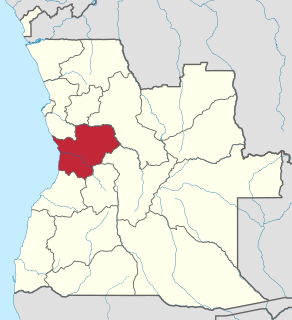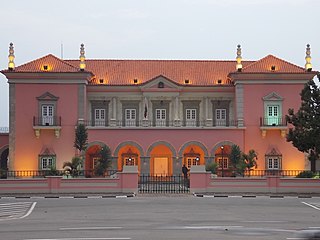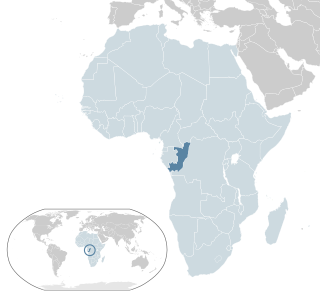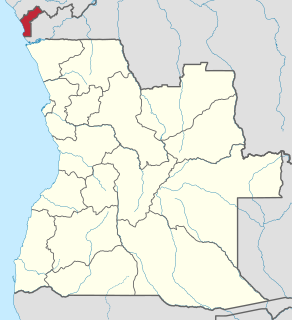
The economy of Angola remains heavily influenced by the effects of four decades of conflict in the last part of the 20th century, the war for independence from Portugal (1961–75) and the subsequent civil war (1975–2002). Despite extensive oil and gas resources, diamonds, hydroelectric potential, and rich agricultural land, Angola remains poor, and a third of the population relies on subsistence agriculture. Since 2002, when the 27-year civil war ended, government policy prioritized the repair and improvement of infrastructure and strengthening of political and social institutions. During the first decade of the 21st century, Angola's economy was one of the fastest-growing in the world, with reported annual average GDP growth of 11.1 percent from 2001 to 2010. High international oil prices and rising oil production contributed to strong economic growth, although with high inequality, at that time.

Angola is a country in southwestern Africa. The country's name derives from the Kimbundu word for king. Angola was first settled by San hunter-gatherer societies before the northern domains came under the rule of Bantu states such as Kongo and Ndongo. In the 15th century, Portuguese colonists began trading, and a settlement was established at Luanda during the 16th century. Portugal annexed territories in the region which were ruled as a colony from 1655, and Angola was incorporated as an overseas province of Portugal in 1951. After the Angolan War of Independence, which ended in 1974 with an army mutiny and leftist coup in Lisbon, Angola achieved independence in 1975 through the Alvor Agreement. After independence, Angola entered a long period of civil war that lasted until 2002.

The National Union for the Total Independence of Angola is the second-largest political party in Angola. Founded in 1966, UNITA fought alongside the Popular Movement for the Liberation of Angola (MPLA) in the Angolan War for Independence (1961–1975) and then against the MPLA in the ensuing civil war (1975–2002). The war was one of the most prominent Cold War proxy wars, with UNITA receiving military aid initially from People's Republic of China from 1966 until October 1975 and later from the United States and apartheid South Africa while the MPLA received support from the Soviet Union and its allies, especially Cuba.

Cuanza Sul Province is a province of Angola. It has an area of 55,660 square kilometres (21,490 sq mi) and a population of 1,881,873. Sumbe is the capital of the province. Don Francisco Inocêncio de Sousa Coutinho founded the province in 1769 as Novo Redondo.

Huambo, formerly Nova Lisboa, is the third-most populous city in Angola, after the capital city Luanda and Lubango, with a population of 595,304 in the city and a population of 713,134 in the municipality of Huambo. The city is the capital of the province of Huambo and is located about 220 km E from Benguela and 600 km SE from Luanda. Huambo is a main hub on the Caminho de Ferro de Benguela (CFB), which runs from the port of Lobito to the Democratic Republic of the Congo's southernmost province, Katanga. Huambo is served by the Albano Machado Airport.

Lunda Norte is a province of Angola. It has an area of 103,760 km² and a population of 862,566. Angola's first President, Agostino Neto, made Lucapa the provincial capital after independence, but the capital was later moved to Dundo. The province borders the Democratic Republic of Congo in the northeast and Lunda Sul in the south. The province is rich in gold and diamonds, but remains vastly underdeveloped and impoverished. UNITA used the money generated from the sale of diamonds to fund war efforts. Cuango River valley, the richest diamond area of Angola is located in the province. Mining is done by notable companies like DeBeers and Endiama. The Lunda province whose capital was Saurimo was created by the Portuguese colonial empire on July 13, 1895. It was divided into Lunda-Sul and Lunda-Norte subdivisions through a constitution act in 1978 by the People's Movement for the Liberation of Angola (MPLA) government. Iron and manganese mining are also important economic activities. It is well known for its sculptures. The most notable one is The Thinker, a sculpture of a man holding his head. It is rich in terms of flora and fauna.

The Angolan War of Independence, called in Angola the Luta Armada de Libertação Nacional, began as an uprising against forced cultivation of cotton, and it became a multi-faction struggle for the control of Portugal's overseas province of Angola among three nationalist movements and a separatist movement. The war ended when a leftist military coup in Lisbon in April 1974 overthrew Portugal's Estado Novo dictatorship, and the new regime immediately stopped all military action in the African colonies, declaring its intention to grant them independence without delay.

The Angolan Civil War was a civil war in Angola, beginning in 1975 and continuing, with interludes, until 2002. The war immediately began after Angola became independent from Portugal in November 1975. The war was a power struggle between two former anti-colonial guerrilla movements, the communist People's Movement for the Liberation of Angola (MPLA) and the turned anti-communist National Union for the Total Independence of Angola (UNITA). The war was used as a surrogate battleground for the Cold War by rival states such as the Soviet Union, Cuba, South Africa, and the United States.

Beitbridge is a border town in the province of Matabeleland South, Zimbabwe. The name also refers to the border post and bridge spanning the Limpopo River, which forms the political border between South Africa and Zimbabwe. The border on the South African side of the river is also named Beitbridge.
The Battle of Cuito Cuanavale was fought intermittently between 14 August 1987 and 23 March 1988, south and east of the town of Cuito Cuanavale, Angola, by the People's Armed Forces for the Liberation of Angola (FAPLA) and advisors and soldiers from Cuba, USSR, Vietnam, ANC and SWAPO against South Africa, and soldiers of the National Union for the Total Independence of Angola (UNITA) during the Angolan Civil War and South African Border War. The battle was the largest engagement of the Angolan conflict and the biggest conventional battle on the African continent since World War II. UNITA and its South African allies defeated a major FAPLA offensive towards Mavinga, preserving the former's control of southern Angola. They proceeded to launch a bloody but inconclusive counteroffensive on FAPLA defensive positions around the Tumpo River east of Cuito Cuanavale.
Dundo, or Dundo-Chitato, is a former mining town, with a population of 177,604 (2014), now a city and the provincial capital of Lunda Norte in Angola. Established in the early part of the 20th century as a planned diamond mining community, Dundo has continued to grow, has its own airport and is now being superseded by a new city, New Dundo.

The South African Border War, also known as the Namibian War of Independence, and sometimes denoted in South Africa as the Angolan Bush War, was a largely asymmetric conflict that occurred in Namibia, Zambia, and Angola from 26 August 1966 to 21 March 1990. It was fought between the South African Defence Force (SADF) and the People's Liberation Army of Namibia (PLAN), an armed wing of the South West African People's Organisation (SWAPO). The South African Border War resulted in some of the largest battles on the African continent since World War II and was closely intertwined with the Angolan Civil War.
Operation Alpha Centauri was a South African military operation during the Angolan Civil War and South African Border War to halt an offensive launched by the People's Armed Forces of Liberation of Angola (FAPLA) towards Angola's Cuando Cubango Province. Its objective was to prevent FAPLA forces from reaching Jamba, a strategic town which functioned as the de facto headquarters of the National Union for the Total Independence of Angola (UNITA) and its armed wing.

The Second Republic of the Congo Civil War was the second of two ethnopolitical civil conflicts in the Republic of the Congo, beginning on 5 June 1997 and continuing until 29 December 1999. The war served as the continuation of the civil war of 1993–1994 and involved militias representing three political candidates. The conflict ended following the intervention of the Angolan army, which reinstated former president Denis Sassou Nguesso to power.
The 2000s in Angola saw the end of a 27-year-long civil war (1975–2002) and economic growth as foreign nation's began to invest in Angola's untapped petroleum reserves. The government continues to resettle internally displaced persons as its economy recovers and expands.

The People's Armed Forces of Liberation of Angola or FAPLA was originally the armed wing of the People's Movement for the Liberation of Angola (MPLA) but later (1975–1991) became Angola's official armed forces when the MPLA took control of the government.
In the 1990s in Angola, the last decade of the Angolan Civil War (1975–2002), the Angolan government transitioned from a nominally communist state to a nominally democratic one, a move made possible by political changes abroad and military victories at home. Namibia's declaration of independence, internationally recognized on April 1, eliminated the southwestern front of combat as South African forces withdrew to the east. The MPLA abolished the one-party system in June and rejected Marxist-Leninism at the MPLA's third Congress in December, formally changing the party's name from the MPLA-PT to the MPLA. The National Assembly passed law 12/91 in May 1991, coinciding with the withdrawal of the last Cuban troops, defining Angola as a "democratic state based on the rule of law" with a multi-party system.
Mining in Angola is an activity with great economic potential since the country has one of the largest and most diversified mining resources of Africa. Angola is the third largest producer of diamonds in Africa and has only explored 40% of the diamond-rich territory within the country, but has had difficulty in attracting foreign investment because of corruption, human rights violations, and diamond smuggling. Production rose by 30% in 2006 and Endiama, the national diamond company of Angola, expects production to increase by 8% in 2007 to 10,000,000 carats (2,000 kg) annually. The government is trying to attract foreign companies to the provinces of Bié, Malanje and Uíge. Angola has also historically been a major producer of iron ore.

The Cabinda War is an ongoing separatist insurgency, waged by the Front for the Liberation of the Enclave of Cabinda (FLEC) against the government of Angola. FLEC aims at the restoration of the self-proclaimed Republic of Cabinda, located within the borders of the Cabinda province of Angola.
Frente Leste was the name of the theater of Portuguese Armed Forces' anti-guerrilla operations in the East of Angola, during the Portuguese Colonial War (1961-1974). After the success of the Portuguese military in the Eastern front by 1973, it started to be known as the Eastern Zone, since guerrilla warfare episodes were nonexistent. Through economic and social promotion campaigns, including the construction of healthcare, education, sanitation, transport and security infrastructure, the construction of new villages, the training of new black military units like the Flechas, and the foreign units known as the Fiéis and the Leais, the Portuguese operations in the late stage of the anti-guerrilla war in Portuguese Angola, eradicated all the main sources of conflict in the territory.











